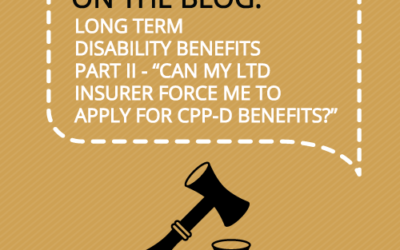Top 6 Issues to Consider When Settling your LTD Claim

Settling your LTD claim is a difficult decision for many. There are a few clear-cut reasons to accept an LTD settlement like if you have an immediate need for cash, you might be able to return to work sooner than you expected, you have figured out another form of employment that allows you to work, or if your condition is severe and you predict a shortened lifespan. Without an obvious reason to settle, the decision can be a tough one to make and not one that should be taken lightly.
What are the chances you will ever be able to work again?
If your condition is severe and long-term, there’s a good chance you won’t be able to work again. While accepting a settlement could offer immediate assistance and might be tempting, long-term benefits can be much more beneficial for someone with a prolonged disability. Nine times out of ten, an insurance company would rather settle a claim than pay monthly benefits. This means a settlement would be best for them financially, which means it wouldn’t be best for you financially.
If the settlement you receive is mismanaged, which we have seen before, you could be left with nothing very quickly. Many have never seen the type of money received from an LTD settlement at one time. Having smaller amounts paid out periodically helps keep people responsible with their money and easily manage their monthly expenses.
Having monthly benefits paid out to you while you cannot work, potentially for life, can add up to a much more significant amount than what you would get in an LTD lump sum settlement. However, if the opposite is true, and your condition is improving, and you think you might be able to soon return to work, you might want to take the settlement offer before it’s gone.
Is the LTD Insurer’s constant oversight making you sick?
With your new or worsening disability, your focus should be on looking after yourself and improving your condition. When making an LTD claim or filing a lawsuit, there’s a good chance your insurer will be looking into you in some form. While they have the right to do this, it can be extremely detrimental to one’s health.
Having to worry about your insurance company adds an extra layer of burden to one’s plate that doesn’t make life any easier. If the thoughts of being surveilled, having to be in constant communication with someone you consider is out to get you, and dealing with large amounts of paperwork is causing you distress, it might be the best idea to settle now instead of going through the trial process which could add even more stress to your life.
Do you have other benefits that will expire if you settle your claim on a buyout or surrender?
Pension
If you’re on disability, contributions to the Canadian Pension Plan (CPP) continue to be made. If you stop working because of a disability and your benefits claim is denied, your CPP contributions are no longer made and your retirement fund is frozen at that point. If you settle a claim without accounting for the many years of CPP contributions that should be made as if you were working, your situation for retirement could be negatively impacted.
Let’s say you settle for $200,000 without accounting for CPP contributions and are unable to go back to work; you may have just given up $500,000 in CPP contributions that would have been made. What you’ll receive for a pension if contributions end from the date you settle versus if that additional 500k in contributions was made is exponentially different. Once you’re eligible for your pension, it’s payable until death. This means that for the next 20-25 years, you could be forced to live on $500 per month rather than $4000 per month. This difference would have a massive effect on your quality of life.
Sadly, we have seen lawyers inexperienced in LTD litigation not account for CPP contributions when making a settlement and end up putting a plaintiff in a bad position. Luckily for the plaintiff, but not so much for their lawyer, the plaintiff’s contributions will likely be reinstated in some amount and paid out by the lawyer’s own insurance.
Medical and Dental
If you settle your claim in a lump sum buyout or surrender, you will likely lose your medical or dental benefits if they were included in your LTD insurance. If you don’t consider this before settling, it could be a grave mistake. If you or a family member relies on your benefits to cover an expensive medication they need to survive, you could be stuck paying for it out of pocket. If the medication is exceedingly pricey, you could end up putting most of your LTD benefits towards covering the medicine now, if it’s even enough to cover the cost.
Life Insurance
If your LTD plan includes life insurance, the premium for your life insurance benefits is waived if you’re on LTD. If while you were working, $35 or so may have been deducted from each paycheque to cover your life insurance benefits. Now, while receiving LTD benefits, that amount is no longer taken off of what your insurance company pays out. However, if your benefits are bought-out or settled, you will no longer be covered by life insurance.
Tax benefits of a buyout or surrender
Pursuing an LTD lump sum buyout requires you (the insured) to surrender all of your future rights under the policy. Knowing the tax implications of a buyout for your LTD policy will help determine the actual amount you will receive in a settlement.
Most often, all disability benefits received are subject to taxation. Employer-paid premiums, however, can become complicated depending on who is ultimately paying for them and whether they are paid for in pre-tax or post-tax dollars.
If you, the employee, pays the entire premium with zero contribution from your employer with post-tax dollars, any benefits you receive are non-taxable. The exception to this is if your employer pays your long-term disability premium and does not include the amount paid in your gross wages, then your benefits will be taxable to you. If your long-term disability benefits are considered taxable income, you need to be careful with negotiating your lump sum buyout, so you aren’t taxed on the entire lump sum in one year.
Can you win your case at trial?
Your insurance provider will usually like to avoid going to trial at all costs for several reasons. We don’t want to put our clients through the trial process, but sometimes taking your lawsuit to trial can get you a significantly better outcome than settling.
Our experienced LTD lawyers have the knowledge and expertise to know when it’s worth going to trial or taking an LTD policy buyout. Having a solid understanding of when to take a case to trial can save you a great deal of time, money, and effort if settling is the best option for you. If our lawyers think those resources should be spent on a trial, it’s because we believe you have a strong chance of winning in court and having your LTD benefits fully reinstated, which is far more beneficial compared to taking a settlement.
Can you afford to keep fighting the LTD Insurer?
Fighting for your benefits means you’ve been denied payment since you stopped working. Anyone can only go on so long without being paid before they have to start looking for another source of income. In most of our cases, we will fund what is needed to advance your claim, and we will not ask you for any upfront fees to cover these expenses to help your battle. However, if your battle with your insurance company is prolonged, it can be financially draining on the pocketbook even with our assistance.
Making a settlement is always faster than taking a case to trial. If you cannot afford to keep fighting your LTD insurer, sometimes it’s better to take the LTD settlement so that you can pay your bills or look after your family. If you can keep fighting for the benefits you truly deserve, we strongly recommend you do so.
Our LTD lawyers at Valent Legal are prepared to help you make the best decision for your LTD lawsuit. Our lives revolve around getting the very best outcome for your LTD settlement or trial. To understand more about what LTD litigation might look like for you or to start a claim, you can book a free consultation with Valent Legal.






















